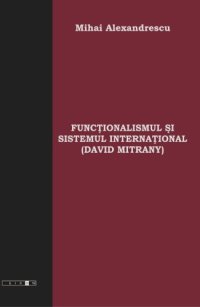
Ebook: Funcţionalismul şi Sistemul Internaţional (David Mitrany)
Author: Alexandrescu Mihai
- Tags: David Mitrany Functionalism International Relations Theories Mihai Alexandrescu
- Year: 2010
- Publisher: Eikon
- City: Cluj-Napoca
- Language: Romanian
- pdf
In a heated debate over the idea of rebuilding the world of states, David Mitrany came to explain that international peace could not be reduced only to preventing violence between actors but had to take into account the social and economic factor, essentially the need for social units, beyond a territorial-constitutional one. He stressed that the real issue of security was not to keep separate nations peacefully but to get them to work together.
Looking at the whole work of David Mitrany, we notice an evolution of his vision on the organization of the international system. His intellectual and professional experiences, the chance to participate in the theoretical debate of International Relations in the interwar period provided him with the framework for modeling his conception of the organization of the international system.
Mitrany not intend to crumble national sovereignties to create an international sovereignty; he did not seek to lay the foundations of a federation or a global state, he proposed a scheme for organizing
peace, and not one to avoid wars.
Functionalism marked the theoretical debate on the reorganization of the international system in the middle of the last century. Mitrany did not create a school, he distinguished himself as an independent thinker, but the alternative he formulated in the analysis of the international system was the basis for launching important schools in the theory of international relations. We can say that David Mitrany benefited from a context favorable to the exposure of the functionalist alternative.
If the same context had existed in the time of Reinsch or Woolf, to which should be added uninterrupted perseverance, Mitrany probably would not have been considered the leader of the functionalist current today. The proof of this context is that his 1933 work, which was much more complex in terms of argumentation, did not benefit from the same interest from his contemporaries as that of 1943.
Looking at the whole work of David Mitrany, we notice an evolution of his vision on the organization of the international system. His intellectual and professional experiences, the chance to participate in the theoretical debate of International Relations in the interwar period provided him with the framework for modeling his conception of the organization of the international system.
Mitrany not intend to crumble national sovereignties to create an international sovereignty; he did not seek to lay the foundations of a federation or a global state, he proposed a scheme for organizing
peace, and not one to avoid wars.
Functionalism marked the theoretical debate on the reorganization of the international system in the middle of the last century. Mitrany did not create a school, he distinguished himself as an independent thinker, but the alternative he formulated in the analysis of the international system was the basis for launching important schools in the theory of international relations. We can say that David Mitrany benefited from a context favorable to the exposure of the functionalist alternative.
If the same context had existed in the time of Reinsch or Woolf, to which should be added uninterrupted perseverance, Mitrany probably would not have been considered the leader of the functionalist current today. The proof of this context is that his 1933 work, which was much more complex in terms of argumentation, did not benefit from the same interest from his contemporaries as that of 1943.
Download the book Funcţionalismul şi Sistemul Internaţional (David Mitrany) for free or read online
Continue reading on any device:

Last viewed books
Related books
{related-news}
Comments (0)